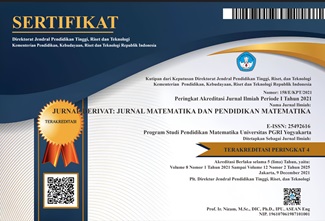Analisis Prediksi Kemungkinan Pergantian Auditor Pada Perusahaan Properti Dengan Menggunakan Linear Probability Model
DOI:
https://doi.org/10.31316/j.derivat.v7i1.871Abstract
This study aims to analyze the prediction of the possibility of an auditor switching in property companies listed on the Indonesia Stock Exchange in 2017 based on the Public Accountant Firm’s size and management switching using a linear probability model. The data used are secondary data obtained from the financial statements of property companies. Property companies that meet the requirements in the study as a sample of 33 companies. To estimate the linear probability model using the ordinary least square method. The model that has been obtained was tested by t-test and F test. The results of the data analysis can be concluded that the model obtained can be used to predict the possibility of a property company auditor switching based on the predictor variable of Public Accountant Firm’s size and management switching with a predictive reliability level of 84.84%.
ÂÂ
Keywords: linear probability model, auditor switching, Public Accountant Firm’s size, management switching, ordinary least square method.
References
Bawono, I.R., dan Singgih, E.M. (2010). Faktor-faktor Dalam Diri Auditor Dan Kualitas Audit: Studi Pada KAP ‘Big Four’ Di Indonesia. Jurnal Akuntansi & Auditing Indonesia. Vol. 14 (2).
Draper, N.R, dan Smith, H. 1992. Applied Regression Analysis. John Wiley & Sons, Inc. Terjemahan oleh Bambang Sumantri. Analisis Regresi Terapan. Edis Kedua. Jakarta : Gramedia Pustaka Utama.
Gaspersz, V. (1992). Teknik Analisis Dalam Penelitian Percobaan. Bandung: Penerbit Tarsito.
Harnanto, N., Wijayanti, A., dan Masitoh, E. (2019). Faktor-faktor Yang Mempengaruhi Auditor Switching (Studi Empiris Perusahaan Perbankan Yang Terdaftar Di BEI Periode 2014-2017). Tirtayasa Ekonomika. Vol. 14 (1), 35-52.
Haryanto, D.N. (2018). Faktor-faktor Yang Mempengaruhi Auditor Switching Di Perusahaan Manufaktur Indonesia (Studi Empiris Pada Perusahaan Manufaktur Yang Terdaftar Di Bursa Efek Indonesia tahun 2011-2014). Skripsi. Surakarta: Universitas Muhammadiyah Surakarta.
Kholipah, S., dan Suryandari, D. (2019). Faktor-faktor Yang Mempengaruhi Auditor Switching Pada Perusahaan Keuangan Yang Terdaftar Di BEI Periode 2015-2017). Jurnal Akuntansi. Vol. 9 (2), 83-96.
Kleinbaum, D.G. (1992). Logistic Regression: A Self-Learning Text. New York: Springer.
Kuncoro, M. (2001). Metode Kuantitatif: Teori Dan Aplikasi Untuk Bisnis Dan Ekonomi. Edisi Pertama. Yogyakarta: Unit Penerbit dan Percetakan AMP YKPN.
Munfatehah, N.Z., Askandar, N.S., dan Afifudin. (2018). Analisis Faktor-faktor Yang Mempengaruhi Auditor Switching Secara Voluntary (Studi Empiris Terhadap Perusahaan Perbankan Yang Terdaftar Di Bursa Efek Indonesia Periode 2011-2015). Jurnal Ilmiah Riset Akuntansi. Vol. 7 (5), 31-43.
Pratini, I.G.A.A, dan Astika, P.I. (2013). Fenomena Pergantian Auditor Di Bursa Efek Indonesia. E-Journal Akuntansi Udayana. Vol. 5 (2), 470-482.
Pratitis, Y.T. (2010). Auditor Switching: Analisis Berdasar Ukuran KAP, Ukuran Klien Dan Financial Distress. Accounting Analysis Journal. Vol. 1 (1), 27-32.
Rosadi, D. (2011). Analisis Ekonometrika & Runtun Waktu Terapan Dengan R. Yogyakarta: Penerbit ANDI.
Sudjana. (1992). Teknik Analisis Regresi Dan Korelasi: Bagi Para Peneliti. Bandung: Penerbit Tarsito.
Downloads
Published
Issue
Section
Citation Check
License
Authors who publish with this journal agree to the following terms:
-
Authors retain copyright and grant the journal right of first publication with the work simultaneously licensed under a Creative Commons Attribution-ShareAlike 4.0 International License that allows others to share the work with an acknowledgment of the work's authorship and initial publication in this journal.
- Authors are able to enter into separate, additional contractual arrangements for the non-exclusive distribution of the journal's published version of the work (e.g., post it to an institutional repository or publish it in a book), with an acknowledgment of its initial publication in this journal.
- Authors are permitted and encouraged to post their work online (e.g., in institutional repositories or on their website) prior to and during the submission process, as it can lead to productive exchanges, as well as earlier and greater citation of published work (See The Effect of Open Access).







